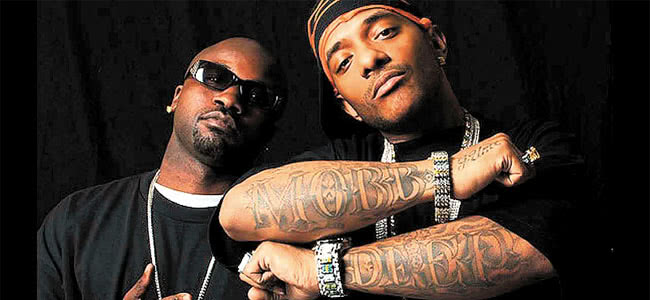Usually an artist would be pretty happy with themselves if they scored a glowing review of their work, especially if it was from the notoriously strict markers over at Pitchfork.
Apparently that’s not the case when it comes to legendary New York rap duo Mobb Deep.
This morning Pitchfork published a review of Mobb Deep’s reissued version of their iconic 1995 debut album, The Infamous, which features 10 previously unreleased recordings from the original studio sessions.
The reviewer, Jayson Greene, offered his gushing praise for the re-release, writing: “the disc of rare and unreleased tracks from the 1994 The Infamous sessions… is exactly the sort of thing that reissues are made for… and are the equal of anything that made The Infamous.”
Greene went on to award the reissue with the website’s highest accolade possible – a perfect score of 10.
All good, right? Everyone’s happy? Not quite.
It’s safe to say Greene never thought he’d see a reaction like this in his Twitter feed from one half of Mobb Deep himself, Prodigy.
Who the fuck is jayson greene at http://t.co/qmIgcr2s1v??? We looking for u bitch boy
— PRODIGY MOBBDEEP (@PRODIGYMOBBDEEP) April 9, 2014
Yep – he definitely didn’t.
@PRODIGYMOBBDEEP Whoa! That is intense. We actually met once, I interviewed you about your book.
— Jayson Greene (@Jayson_Greene) April 9, 2014
It didn’t end there, though, and Prodigy’s series of tweets revealed it wasn’t the perfect score he had a problem with, but something much deeper. Namely, that an upper middle-class white writer for a Chicago music tastemaker was thought qualified to rate and analyse an influential rap duo hailing from Queens, New York. Or, as Prodigy puts it:
Our music is for the world to enjoy. But if u not from our blood stream dont try to break us down to a science like u an expert in our field
— PRODIGY MOBBDEEP (@PRODIGYMOBBDEEP) April 9, 2014
If u don’t come from our blood stream how can u make a proper assessment of our music? U don’t understand it. U a outsider peeking in.
— PRODIGY MOBBDEEP (@PRODIGYMOBBDEEP) April 9, 2014
So while the rapper’s comments might’ve initially seemed like a random, unjustified rage attack against a helpless reviewer – he did just get a perfect score, after all – Prodigy opens up a much wider, important debate within the music industry.
He raises the question: should privileged middle-class white guys be commenting on rap music when they have no firsthand experience of the culture and the struggles and oppression that come with it – in other words, no credibility on the matter?
As New Republic report, in November last year the editor of Rap Radar, Brian “B.Dot” Miller, shot out similar criticism to Spin writer Jordan Sargent for his review of young rapper Chief Keef’s debut album (Sargent graded it an 8 out of 10).
“Cultural tourists… [and] outsiders like [Sargent] in hipster media that get a hard-on by overanalyzing black music… Please stop writing about MY culture,” Miller lamented. (Make of that what you will.)
What makes matters worse with the case of Jayson Greene then, is his responses to Prodigy’s arguments about a very sensitive topic.
Today was the day that @PRODIGYMOBBDEEP called me a “bitch boy” on Twitter.
— Jayson Greene (@Jayson_Greene) April 9, 2014
My mom got concerned; I told her not to worry, it’s just the guy who rapped “Stab your brain with yourr nosebone” mad at me.
— Jayson Greene (@Jayson_Greene) April 9, 2014
(That probably wasn’t nice of me)
— Jayson Greene (@Jayson_Greene) April 9, 2014
Guys, it was really Jayson Greene from ORCHID who wrote all those things about Mobb Deep. That guy’s a DICK.
— Jayson Greene (@Jayson_Greene) April 9, 2014
Alternatively, the whole situation has been summed up pretty nicely by this guy.
In the year 2014, Prodigy of Mobb Deep is using Twitter to go after a Pitchfork editor. The future is so lame. pic.twitter.com/5EhiuV1SLJ
— Tomas Rios (@TheTomasRios) April 9, 2014



































